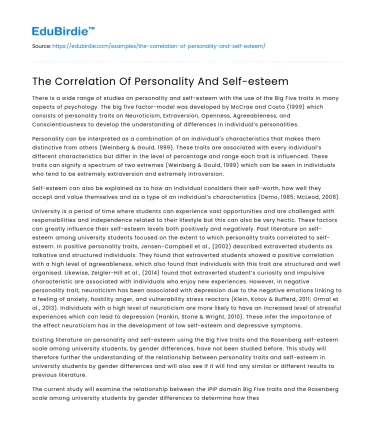There is a wide range of studies on personality and self-esteem with the use of the Big Five traits in many aspects of psychology. The big five factor-model was developed by McCrae and Costa (1999) which consists of personality traits on Neuroticism, Extraversion, Openness, Agreeableness, and Conscientiousness to develop the understanding of differences in individual’s personalities.
Personality can be interpreted as a combination of an individual's characteristics that makes them distinctive from others (Weinberg & Gould, 1999). These traits are associated with every individual’s different characteristics but differ in the level of percentage and range each trait is influenced. These traits can signify a spectrum of two extremes (Weinberg & Gould, 1999) which can be seen in individuals who tend to be extremely extraversion and extremely introversion.
Save your time!
We can take care of your essay
- Proper editing and formatting
- Free revision, title page, and bibliography
- Flexible prices and money-back guarantee
Self-esteem can also be explained as to how an individual considers their self-worth, how well they accept and value themselves and as a type of an individual’s characteristics (Demo, 1985; McLeod, 2008).
University is a period of time where students can experience vast opportunities and are challenged with responsibilities and independence related to their lifestyle but this can also be very hectic. These factors can greatly influence their self-esteem levels both positively and negatively. Past literature on self-esteem among university students focused on the extent to which personality traits correlated to self-esteem. In positive personality traits, Jensen-Campbell et al., (2002) described extraverted students as talkative and structured individuals. They found that extraverted students showed a positive correlation with a high level of agreeableness, which also found that individuals with this trait are structured and well organised. Likewise, Zeigler-Hill et al., (2014) found that extraverted student’s curiosity and impulsive characteristic are associated with individuals who enjoy new experiences. However, in negative personality trait, neuroticism has been associated with depression due to the negative emotions linking to a feeling of anxiety, hostility anger, and vulnerability stress reactors (Klein, Kotov & Bufferd, 2011; Ormal et al., 2013). Individuals with a high level of neuroticism are more likely to have an increased level of stressful experiences which can lead to depression (Hankin, Stone & Wright, 2010). These infer the importance of the effect neuroticism has in the development of low self-esteem and depressive symptoms.
Existing literature on personality and self-esteem using the Big Five traits and the Rosenberg self-esteem scale among university students, by gender differences, have not been studied before. This study will therefore further the understanding of the relationship between personality traits and self-esteem in university students by gender differences and will also see if it will find any similar or different results to previous literature.
The current study will examine the relationship between the IPIP domain Big Five traits and the Rosenberg scale among university students by gender differences to determine how these personality traits influence self-esteem.
References
- Bhattacharjee, A., Bhattacharya, N., & Debbarma, R. (2018). Personality pattern and quality of life among neurotic patients: A comparative study. Indian Journal of Positive Psychology, 9(1), 139-142.
- Demo, D. H. (1985). The measurement of self-esteem: Refining our methods. Journal of personality and social psychology, 48(6), 1490.
- Hankin, B. L., Stone, L., & Wright, P. A. (2010). Co-rumination, interpersonal stress generation, and internalizing symptoms: Accumulating effects and transactional influences in a multi-wave study of adolescents. Development and Psychopathology, 22(1), 217.
- Jensen-Campbell, L. A., Adams, R., Perry, D. G., Workman, K. A., Furdella, J. Q., & Egan, S. K. (2002). Agreeableness, extraversion, and peer relations in early adolescence: Winning friends and deflecting aggression. Journal of Research in Personality, 36(3), 224-251.
- Kaur, A., & Singh, P. G. (2019, March). The Relationship between Personality and Self-Esteem towards University Students in Malaysia. In 4th ASEAN Conference on Psychology, Counselling, and Humanities (ACPCH 2018). Atlantis Press.
- Klein, D. N., Kotov, R., & Bufferd, S. J. (2011). Personality and depression: explanatory models and review of the evidence. Annual review of clinical psychology, 7, 269.
- McCrae, R. R., & Costa Jr, P. T. (2008). The five-factor theory of personality.
- Mu, W., Luo, J., Rieger, S., Trautwein, U., & Roberts, B. (2019). The relationship between self-esteem and depression when controlling for neuroticism. Collabra: Psychology, 5(1).
- NEO Domains Key. (n.d.). Retrieved from Ori.org website: https://ipip.ori.org/newNEODomainsKey.htm
- Niazi, S., & Mehmood, B. (2017). Personality Traits as Predictor of Self-esteem of University Students: Moderating Role of Openness to Experience. Journal of Behavioural Sciences, 27(2).
- Ormel, J., Jeronimus, B. F., Kotov, R., Riese, H., Bos, E. H., Hankin, B., ... & Oldehinkel, A. J. (2013). Neuroticism and common mental disorders: meaning and utility of a complex relationship. Clinical psychology review, 33(5), 686-697.
- Zeigler-Hill, V., Holden, C. J., Enjaian, B., Southard, A. C., Besser, A., Li, H., & Zhang, Q. (2015). Self-esteem instability and personality: The connections between feelings of self-worth and the big five dimensions of personality. Personality and Social Psychology Bulletin, 41(2), 183-198.






 Stuck on your essay?
Stuck on your essay?

